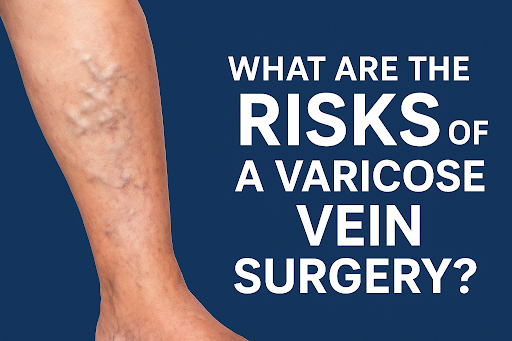Varicose veins can be more than just a cosmetic concern—they often lead to pain, heaviness, swelling, and fatigue in the legs. When conservative options fail, surgery may be suggested by a vein doctor to restore healthy circulation. But like any surgical procedure, varicose vein surgery carries certain risks.
Let’s explore what those risks are, how you can minimize them, and what alternatives exist today.

Understanding Varicose Vein Surgery
Varicose vein surgery aims to remove or close off problematic veins to improve blood flow. Depending on the severity of the condition, your vein specialist in East Stroudsburg may recommend traditional vein stripping or modern minimally invasive treatments like endovenous laser therapy.
When Is Surgery Recommended?
Surgery is typically considered when:
- Non-surgical vein treatments in Bethlehem such as compression therapy or medication fail.
- You experience severe pain, ulcers, or swelling.
- The veins are large, twisted, or causing skin changes.
A qualified vein doctor evaluates your condition through ultrasound imaging before recommending the best treatment path.
Types of Varicose Vein Surgeries
1. Vein Stripping and Ligation
This traditional approach involves tying off and removing the damaged vein through small incisions.
2. Endovenous Laser Treatment (EVLT)
A laser fiber is inserted into the vein, closing it off with heat. This is less invasive and widely used in vein treatment Hackettstown clinics.
3. Radiofrequency Ablation (RFA)
Similar to EVLT, but uses radiofrequency energy to seal the vein.
4. Sclerotherapy
A chemical solution is injected to collapse small to medium-sized veins.
5. Ambulatory Phlebectomy
Tiny incisions remove surface veins under local anesthesia.
Potential Risks of Varicose Vein Surgery
Even though these procedures are generally safe, every surgical method carries some potential side effects. Understanding them helps you prepare and recover better.
Risk #1: Infection
Any surgery that involves incisions comes with a risk of infection. Though rare, infections may cause redness, swelling, or pus formation at the incision site. Proper wound care and antibiotics usually prevent this complication.
Risk #2: Blood Clots
Post-surgery immobility can sometimes lead to deep vein thrombosis (DVT)—a serious but uncommon condition. Symptoms include swelling, warmth, or pain in the leg. Regular movement after surgery can significantly reduce this risk.
Risk #3: Nerve Injury
In some cases, small nerves near the treated veins can be affected, leading to numbness or tingling. These sensations often improve within a few months, but rarely, they may persist.
Risk #4: Recurrence of Varicose Veins
Unfortunately, varicose veins can sometimes return, even after surgery. This happens when underlying venous reflux isn’t fully treated. Follow-up care with a vein specialist East Stroudsburg helps monitor and prevent recurrence.
Risk #5: Scarring and Skin Discoloration
Minor scarring or temporary bruising is normal. Some patients may notice slight discoloration, especially after vein treatments in Bethlehem, but these usually fade with time and proper skincare.
Risk #6: Bleeding or Bruising
Since the procedure involves small veins, slight bleeding or bruising can occur. Applying compression stockings and following your vein doctor’s post-care instructions can help minimize this.
Reducing Risks Before Surgery
Preparation plays a key role in reducing risks. Here’s what you can do:
- Stop smoking at least two weeks before surgery.
- Inform your doctor about any medications or supplements.
- Stay hydrated and follow fasting guidelines.
- Discuss your full medical history with your vein specialist Stroudsburg before proceeding.
Recovery and Aftercare
After varicose vein surgery:
- You may experience mild soreness for a few days.
- Avoid standing for long periods.
- Walk regularly to enhance blood circulation.
- Wear compression stockings as recommended.
Most people return to work within a week after minimally invasive vein treatments in Hackettstown.
Alternative Options to Surgery
Modern medicine offers several non-surgical options for treating varicose veins:
- Laser therapy for small veins.
- Ultrasound-guided sclerotherapy.
- Compression therapy to manage symptoms.
- Lifestyle changes like regular exercise and weight management.
Many patients in Bethlehem and Hackettstown prefer these minimally invasive approaches due to shorter recovery times and fewer risks.
When to See a Vein Doctor
See a vein doctor if you experience:
- Persistent leg pain or swelling
- Visible, bulging veins
- Skin ulcers near your ankles
- Heaviness or throbbing after long hours of standing
Prompt consultation ensures timely vein treatment and better long-term outcomes.
Conclusion
Varicose vein surgery can offer lasting relief from discomfort and improve circulation—but it’s not without risks. The good news? With advanced technology, most complications are rare and manageable under expert care. Whether you’re in East Stroudsburg, Bethlehem, or Hackettstown, always choose an experienced vein specialist for a personalized and safe treatment plan.
Taking proper pre- and post-surgery precautions, along with regular follow-ups, ensures your legs feel lighter, healthier, and pain-free again.
FAQs
1. Is varicose vein surgery painful?
Most modern procedures are minimally invasive and cause little to no pain, thanks to local anesthesia.
2. How long does recovery take?
You can typically resume light activities within a few days, depending on the type of procedure performed.
3. Can varicose veins come back after surgery?
Yes, they can, especially if the root cause—venous reflux—isn’t fully treated. Regular follow-ups help prevent recurrence.
4. Is laser vein treatment better than surgery?
Laser treatments are less invasive and offer faster recovery, making them a popular choice for vein treatments in Bethlehem and nearby areas.
5. Who should perform my varicose vein surgery?
Always consult a certified vein doctor or vein specialist in Hackettstown for accurate diagnosis and safe treatment.







